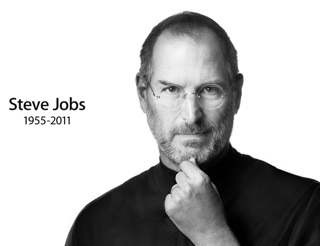 The world lost an island of genius yesterday when Steve Jobs, the co-founder and CEO of Apple died at age 56 of pancreatic cancer.
The world lost an island of genius yesterday when Steve Jobs, the co-founder and CEO of Apple died at age 56 of pancreatic cancer.
There is no better tribute to Mr. Jobs than the script from a famous Apple TV commercial, created in 1997, the year he returned to the company after being forced out, invited back to save the struggling technology company from obscurity. The new ad campaign was called, Think Different.
“Here’s to the crazy ones. The misfits. The rebels. The troublemakers. The round pegs in the square holes. The ones who see things differently…”
“They’re not fond of rules. And they have no respect for the status quo. You can quote them, disagree with them, glorify or vilify them. About the only thing you can’t do is ignore them. Because they change things. They push the human race forward. And while some may see them as the crazy ones, we see genius. Because the people who are crazy enough to think they can change the world, are the ones who do.”
Apple announced the news that Jobs had died with a statement: “We are deeply saddened to announce that Steve Jobs passed away today. Steve’s brilliance, passion and energy were the source of countless innovations that enrich and improve all of our lives. The world is immeasurably better because of Steve. His greatest love was for his wife, Laurene, and his family. Our hearts go out to them and to all who were touched by his extraordinary gifts… Apple has lost a visionary and creative genius, and the world has lost an amazing human being.”
Apple’s website dispensed with all product advertising and instead greeted visitors with a simple page showing Jobs’ name and lifespan next to his black and white portrait (photo above), and invited the public to share their memories, condolences, and thoughts via email.
Forbes last month penned the Top Ten Lessons Steve Jobs taught us, including, “Never fear failure,” and “Listen to the voice in the back of your head that tells you if you’re on the right track.” His most endearing trait as a leader, perhaps, is his shunning of focus groups.
 To forge the iconic path Apple envisioned, Jobs looked inward. “He was one of the first businessmen to say (a focus group) was a waste of time: The customers today don’t know what they want, especially if it’s something they’ve never seen, heard, or touched before. When it became clear that Apple would come out with a tablet, many were skeptical. When people heard the name (iPad), it was a joke in the Twitter-sphere for a day. But when people held one, and used it, it became a ‘must have.’”
To forge the iconic path Apple envisioned, Jobs looked inward. “He was one of the first businessmen to say (a focus group) was a waste of time: The customers today don’t know what they want, especially if it’s something they’ve never seen, heard, or touched before. When it became clear that Apple would come out with a tablet, many were skeptical. When people heard the name (iPad), it was a joke in the Twitter-sphere for a day. But when people held one, and used it, it became a ‘must have.’”
The Apple co-founder’s death has prompted some extraordinary tributes and links to memorials around the web. The Guardian collected 10 unique tributes on a nice page here.
And, oh-by-the-way, one year after the computer visionary was sent packing by the Apple board in 1985, he purchased The Graphics Group and renamed it Pixar, releasing the first digitally animated feature film, Toy Story, in 1995 and a string of similar blockbusters before selling the company to Disney, becoming that company’s single largest stockholder.
In 1997, a floundering Apple brought Jobs back as “interim” CEO.
Google chairman Eric Schmidt explained it this way to Charlie Rose, “If you go back and look at the press in 1994 and 1995, Apple had been completely written off, was allegedly near bankruptcy when Steve came in. Imagine fighting against those odds as an executive, as a leader, as a person. And look at what he achieved in that period. . . By sheer force of will he built a platform that is now the
best in the world for what it does.”
One of my sincere regrets in life was not buying Apple stock back then, in the 1990’s when people said the company was finished, their market share stuck at miniscule. I was a Mac addict, an artist who appreciated the user-friendly style of every Apple endeavor. I never cared what the “masses” thought. I saw the genius and I wanted every bite of that fruit.
If only I had channeled my financial investments through the lens of my own heart. Rest in peace.
(WATCH a video tribute from Bloomberg)




















The ad from 1997 that’s mentioned in this article sounds as if it may have been the source for The Wayseer’s Manifesto.